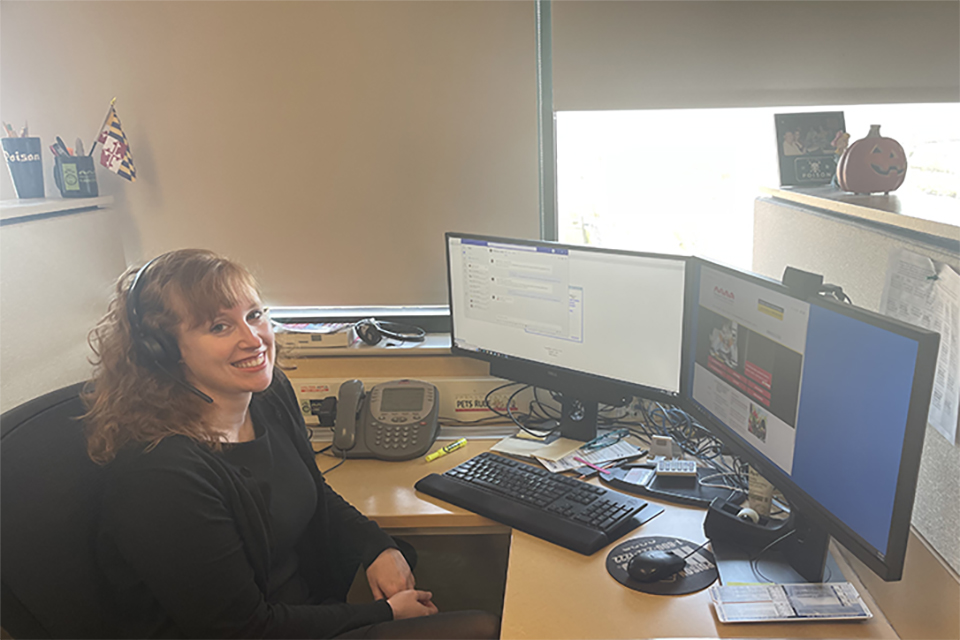Meet the Maryland Poison Center Experts: Liz
Written by: Emily Paterson, Public Education and Communication Specialist
This post originally appeared on the Maryland Poison Center’s blog, eAntidote.
One of the goals of our eAntidote blog is to introduce you to the real poison experts who answer the phones at the Maryland Poison Center (MPC), as well as our staff members. The MPC is located within the Department of Practice, Sciences, and Health Outcomes Research (P-SHOR) at the University of Maryland School of Pharmacy. In addition to being nurses and pharmacists, they are parents, grandparents, artists, athletes, sports fans, and more! Read the Q&A below to get to know one of our specialists: Liz Fugate.
Why did you go into the field of nursing?
I had a health scare when I was younger and the care and kindness that I received from the nurses during the two weeks that I was in the hospital made a lasting impression on me. It felt meaningful to be able to pay it forward since I’m personally so grateful for the work that nurses do. Also, I am good at advocating for people and performing well under pressure in chaotic environments, so it seemed like a natural choice to go into nursing.
How did you end up working at the poison center?
I needed a change after working exclusively in acute care environments for many years, so I started exploring other career options. I worked for a law firm as a legal nurse consultant for a while, then decided that I wanted to go back to something more clinically-related. Nurses do such a wide range of work in so many different settings and I knew I could find something like this that would be a perfect fit. The idea of working at a poison center originally came several years ago when I heard the Radiolab episode about poison centers. I thought it was a really cool place to work, so the idea had been floating around in my brain as a possibility since then.
What do you enjoy most about your work?
Interacting with people all day is what I missed most about doing bedside nursing, and I would say that’s my favorite thing about this role as well. I also like that I am able to apply my previous patient care experience in a different way. It’s a new kind of critical thinking and there are always more things to learn in toxicology! Plus, people who work here are nerds so we are very enthusiastic about the knowledge in our skill set. Allegedly, this job makes you good at trivia, so I’m excited to be able to take advantage of that unofficial benefit!
Why are poison centers and poison specialists like you important?
Poison centers are an extremely important part of public health. We provide education, triage when a poisoning happens, and consult with other members of a patient’s health care team. We are a free resource to people in our communities when they need information from an expert regarding potentially toxic exposures – especially to concerned parents who may be able to avoid a trip to the pediatrician’s office or emergency room by calling us first. We also help health care providers with the best standards of care in emergency, inpatient, and outpatient settings. We provide management assistance for toxic exposures from harmless to the most severe.
What’s an important message you want to share about poison safety?
As a former critical care nurse, I am a big advocate of bystander training because early intervention by everyday people who know what to do in emergency situations can save lives. People are more familiar with trainings such as CPR, first aid, and Stop the Bleed. Training for naloxone administration in suspected opioid overdose situations is less well-known. You can find free trainings online and naloxone can be obtained without a prescription in many areas through local health departments, programs at pharmacies, etc. In addition, the Food and Drug Administration (FDA) just approved over-the-counter (OTC) naloxone, so it should become more easily available in the future. Assisting in an overdose emergency before health care professionals arrive to treat someone might be the critical difference that changes that person’s outcome.
What do you enjoy doing when you’re not working?
I enjoy reading popular science and contemporary fiction books. I love watching reality shows, too. Spending time outside is how I decompress. I’m learning to ski and have been to over half of the US national parks in the last five years. My parents retired and live on a farm now, so I like to visit them and help out around the farm. Finally, spending time with friends and staying in touch with the ones who live farther away is really important to me. Everyone’s been through a lot in the COVID upheaval of the last few years, so I think that making an effort to be there for each other is more essential than ever!

